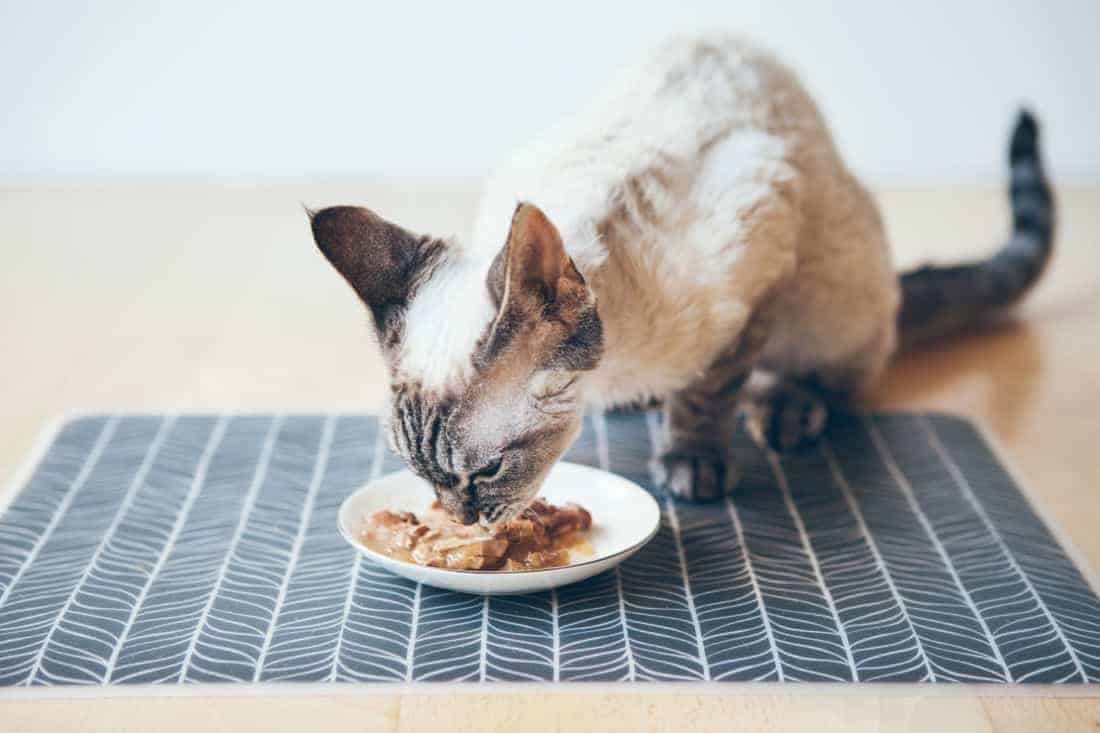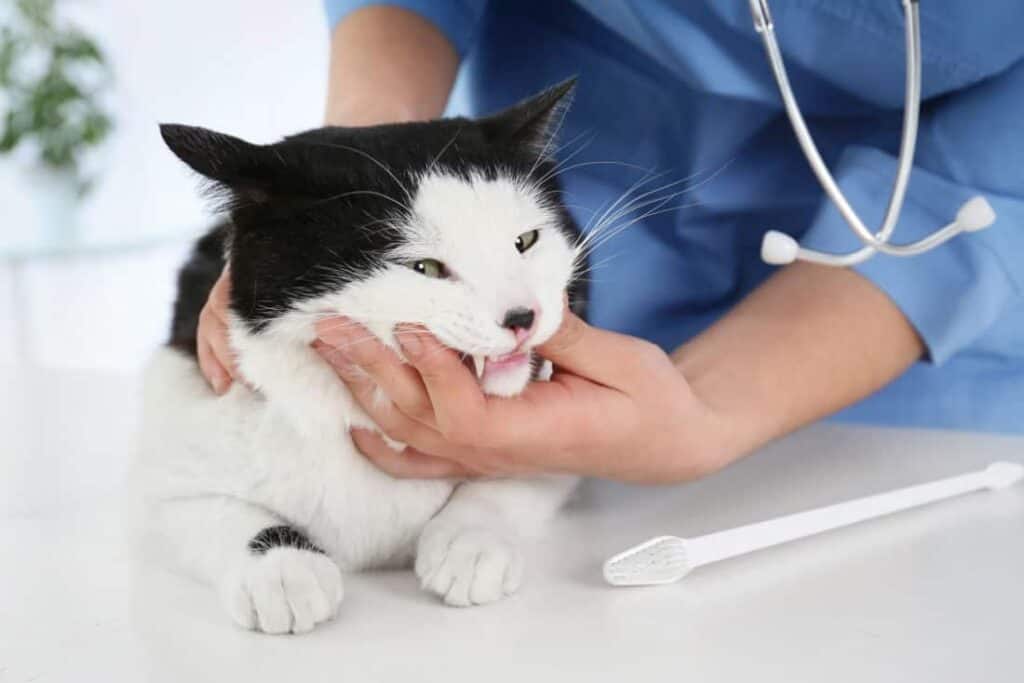Why Does My Cats Breath Smell Like Fish?

Cats are notorious for their love of eating fish. So, cat owners put up with some fish smell floating around in the house every once in a while. If you’re already a fish eater, then the smell may not be that big a problem anyway.
The problem, however, is when there’s this stench of fish smell coming out of your cat’s mouth even when she hasn’t gotten a taste of fish in quite a while.
Before interrogating her about whether she ate fish behind your back, know that fish doesn’t have to be involved for your cat’s breath to smell fishy.
Why does my cat’s breath smell like fish, then? That’s what we’re about to answer!
Cat Attitudes is reader-supported. When you buy through links on our site, we may earn an affiliate commission.
What Causes My Cat’s Breath to Smell Like Fish?
The most common cause is a dental disorder known as periodontal disease, which is one of the many dental diseases cats are susceptible to.
In fact, according to International Cat Care, a staggering 85% of cats over the age of three develop some sort of dental issues. The older the cat, the more serious the issues.
Aside from oral diseases, systemic ones can also lead to bad breath. These include things like kidney and metabolic issues. That’s why it’s crucial to pay a visit to the vet when bad breath persists.
Finally, the reason for your cat’s bad smell can lie in her diet. This happens if she eats fish-based products. Alternatively, it could happen if she goes overboard with eating soft, wet food, which can stick to her teeth and stay there for a long time.
Starting with the most common cause, let’s gain some insight into periodontal disease.
What Is Periodontal Disease?
Periodontal disease is inflammation of gums and different structures surrounding the teeth. The condition passes through some stages before finally turning into full-blown periodontal disease. Let’s start from the beginning.
Plaque
Cats are like humans in that they have harmless bacteria residing in their mouths. When food residue books a place next to this bacteria, however, bacteria feeds on it. Here, the bacteria shows its true colors and goes rogue.
With saliva providing the perfect medium for such interaction, things escalate fast. This leads to the formation of plaque.

Tartar
As if food residue, bacteria, and saliva weren’t already enough, minerals insert themselves in the mix. When this happens, the plaque turns into what’s known as tartar.
The formed tartar is what causes the stinky smell streaming out of your cat’s mouth. What this tartar also does is irritate the cat’s gums, leading to periodontal disease.
Spreading of Inflammation
Initially, the inflammation involves the gum line, which directly neighbors the teeth. Later on, however, the inflammation starts to take hold, spreading deeper in the gum tissue, and also wider to involve more teeth.
As stages advance, the gum and tooth start to drift apart from each other.
Stages of Inflammation
According to the severity and extent of separation between gum and teeth, periodontal disease can be classified into 4 stages. In stage 1, there’s inflammation with no separation, whereas in stage 4, there’s 50% separation, exposing the root of the tooth.
Treatment
Treatment in such cases has two pillars: controlling the plaque and preventing the separation between gum and teeth. This can be done by brushing your cat’s teeth daily using pet-safe toothpaste. Your vet will probably prescribe some other products as well.
Also, the vet may deem it necessary to extract the affected tooth. In severe cases, he might even use other procedures, such as bone replacement.
What Other Oral Problems Can Cause Bad Breath in Cats?
Two other things can be going on in your cat’s mouth and giving rise to this foul smell: foreign bodies and excessive salivation.
Foreign Bodies
Cats are like babies; they put stuff in their mouths that they just shouldn’t. That’s why it isn’t uncommon for cats to frequently have foreign bodies in their mouths, which can be the cause of bad breath.
Small objects like strings and strands of hair can get stuck between the cat’s teeth, decomposing with time. More than just causing a bad smell, objects like that can lead to infections in the surrounding areas.
In instances where you can spot a foreign body lodged in your cat’s mouth, it’s important to refrain from removing it yourself. The foreign object could have firm attachments to other tissues, leading to further damage upon abrupt removal. Go to a vet; they’ll know what to do.
Excessive Salivation
When excessive, saliva can also be the one to blame for the foul smell. Called hyper-salivation, this condition is usually secondary to something else going wrong in the cat’s body, like a metabolic or neurologic disease.
What makes the bad breath even worse is what happens around the lips. After being drenched with drooling, the fur around the cat’s mouth dries up, becomes matted, and develops a bad smell of its own. This can also lead to infections in that area.
So, if there’s excessive salivation alongside the bad smell, that can give you a hint as to the cause of the issue.
What Systemic Diseases Can Lead to Bad Breath in Cats?
Two main systemic diseases can give rise to bad breath: chronic kidney disease and diabetes.
Chronic Kidney Disease
Words like ‘chronic kidney disease’ are surely scary to hear, but you’d be surprised that this condition is fairly common among cats. As per the Pet Health Network, one in every three cats develops this condition.
Mechanism
You might wonder how an issue in the kidney ends up manifesting as a foul odor coming from the mouth. Simply, the kidney is responsible for getting rid of waste products. When it doesn’t function properly, this waste builds up in the blood.
Here, we have to single out a specific waste product: urea. Making up a great part of urine, urea constitutes most of the waste accumulating in the blood in kidney disease. Along with ammonia, which is another waste product, urea can cause an awful smell.
Severity
Chronic kidney disease is silent but lethal; it doesn’t announce its presence with apparent symptoms until it’s too late. That’s why taking your cat to the vet upon noticing continuous bad breath might save her life.
Prevention
For prevention, encourage your cat to drink lots of water and fluids. Also, there’s now an emerging revolutionary test that made early detection of this disease possible: The IDEXX SDMA™ test. This is a screening test, meaning that even healthy cats can undergo it, to ensure that they don’t have the disease.
Diabetes
With diabetes, the smell won’t be more fruity than fishy. Actually, this kind of fruity smell is the hallmark of diabetes, both in cats and humans. It’s also a sign that a common complication of diabetes is taking place: ketoacidosis. Let’s quickly explain this.
Mechanism
Your cat’s cells have needs—energy needs, to be precise. Ordinarily, those needs are met by the constant flow of glucose. For glucose to leave the circulation of blood and enter the cells, however, it needs a certain hormone. This hormone, you’ve guessed it, is insulin.
In diabetes, one of two things happens: either there’s no insulin, or cells have developed insulin resistance. In any event, the glucose doesn’t enter the cells.
As an alternative energy source, the body taps into fat, breaking it down into smaller units, called ketone bodies. These bodies are the source of the telltale fruity smell.
Other Symptoms
To ascertain that diabetes is the cause of the bad smell, there are some accompanying symptoms to watch for. These include:
- Weight loss
- Vomiting
- Peeing a lot
- Drinking too much water
- Eating too little food
- Lack of energy
Coupled with one of the above symptoms, fruity breath is enough reason to pay a visit to the vet.
How Can a Cat’s Diet Lead to Bad Breath?
If your cat has been out lately, there’s a chance she may have gotten her hands on something unsavory to eat. Anything from dead animals to even poop—cats aren’t picky that way. Something like that, while may not be harmful, will definitely give rise to a bad smell.
Even totally normal foods can cause a bad smell. We’re talking about anything soft or wet, because such foods have higher chances of sticking to your cat’s teeth and gum.
From what’s preceded, you can see that bad breath on occasion may not be alarming, and even normal. It’s when the bad smell persists that you should step in and bring a vet on board.
How to Prevent Bad Breath in Cats?
There are three main ways to keep your cat from developing bad breath: tooth brushing, breath fresheners, and dental treats.
Tooth Brushing
The foolproof way to prevent bad breath is to brush your cat’s teeth using a gel or toothpaste made specifically for cats.
How often? Brushing daily yields the best results. As I know that such a task will mostly be a drag, I have some tips for you to make the process smoother.
First, you need to sell the cat on the idea of brushing her teeth so she doesn’t resist. One thing you can do is give her this informative article to read, haha. But, of course, the stuff we talked about might spook her, so it’s better to lure her in with a reward, like a type of food she likes.
It’s worth noting that cats don’t like their mouths being forcibly opened. That’s why you should just stretch the lip and apply the gel to the teeth underneath without bothering to get too deep.
Breath Fresheners
This is a simpler way that can spare you all the brushing. By consistently adding a simple additive treatment to your cat’s water, you can combat any plaque build-up taking place. One recommended breath freshener is Emmy’s Best water additive.
Emmy’s product is actually vet-recommended. As vets realize that daily tooth brushing can be difficult, they gave breath fresheners the stamp of approval as the next best thing.
Dental Treats
These are much like breath fresheners in their effect, except that they’re not water additives. Instead, they’re small, chewable treats that will make undesirable plaques say “ouch!”, while making your cat say “yummy!”
Speaking of which, the best product with regards to dental treats is the Greenies Feline dental treats.
Final Thoughts
Morning breath—who hasn’t experienced that smell? Annoying is one way you’d describe it, but it’s okay; you’ll head to the sink, brush those pearls of yours, and all will be good.
As it turns out, cats aren’t much different in that regard. Occasionally, cats develop bad breath, sometimes with a fishy quality to it, which can be normal.
However, persistent bad breath can be a sign of an underlying illness, the most common of which is periodontal disease. Other oral and systemic diseases can cause that issue as well.
An ounce of prevention is worth a pound of cure. That’s why simple habits like brushing your cat’s teeth or using breath fresheners and dental treats can go a long way. That being said, a visit to the vet won’t hurt. Ensuring your cat’s health is worth any effort!
